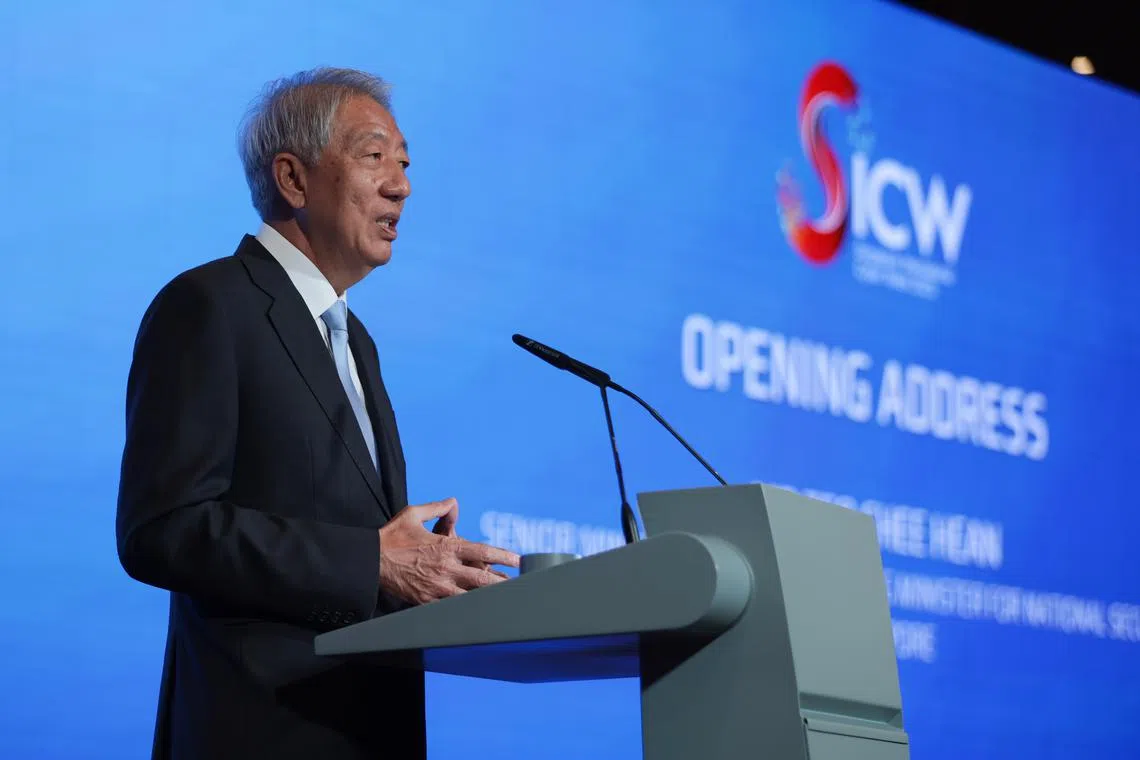Trust in digital space under pressure: SM Teo Chee Hean
Sign up now: Get ST's newsletters delivered to your inbox

Senior Minister Teo Chee Hean giving his opening address at the Singapore International Cyber Week at the Marina Bay Sands Expo and Convention Centre on Oct 16.
ST PHOTO: GIN TAY
SINGAPORE – Trust in the digital domain is under pressure in three key areas – between states, between governments and tech giants, and in the public’s perception of the digital world.
But it is imperative for trust to be built in the digital domain, so that the world can continue to enjoy the dividends from digitalisation, and its benefits are not reversed, said Senior Minister Teo Chee Hean on Monday.
Speaking at a summit at the eighth edition of the Singapore International Cyber Week (SICW), held at the Marina Bay Sands Expo and Convention Centre, Mr Teo, who is also Coordinating Minister for National Security, said the digital domain is constantly evolving, and the world is still in the process of figuring out what the rules and norms are, and how common issues can be solved.
But for any of the questions to be answered, trust is fundamental, he added.
Mr Teo said the world is in a period of intense contestation, pointing to the US-China rivalry, conflict between Israel and Hamas,
This dynamic is also playing out in cyberspace during peacetime, and such activities undermine trust. This deficit of trust makes it harder for states to work together on common issues, and is especially worrying in the digital domain, where many issues, like tackling cross-border cybercrime, require collective action, Mr Teo said.
“The establishment of a rules-based multilateral order in cyberspace will go a long way towards buttressing trust between states. There is a general consensus on what constitutes responsible state behaviour in cyberspace, but the crucial task of codifying this into rules and norms remains,” he said, adding that the work of the United Nations Open-Ended Working Group on the security of information and communications technologies, which Singapore supports, is an important effort.
The second concern is the relationship between governments and the tech industry, said Mr Teo.
Large tech companies wield an unprecedented level of influence over economies and societies, while enjoying a remarkable degree of freedom from regulation and accountability. This has made Big Tech companies pivotal stakeholders in the digital domain, and many challenges, like cyber security and online safety, can be tackled only with their cooperation.
But building trust between Big Tech companies and governments is challenging because the interest of these companies may not align with public or national interests, said Mr Teo. It is important for both sides to find respectful and constructive ways to manage policies that countries find necessary, but which Big Tech considers unfavourable.
“Even where governments recognise the need to work with Big Tech, they may not necessarily know how best to do so because issues of national security, defence and social governance have long been the exclusive domain of governments. This is further complicated by the fact that for the vast majority of countries, Big Tech (firms) are foreign entities.
“Some jostling is inevitable, and responsibilities will have to be revisited, but a healthy accommodation between governments and industry is essential for us to tackle the issues we face in the digital domain,” said the minister.
A third area of concern is public trust in the digital domain, as there is growing concern that online harms such as scams, ransomware, misinformation and other malicious cyber activities are becoming rampant, rendering the digital world unsafe, said Mr Teo.
“The digital highways and streets must be safe for us to venture out on, including for children and digital novices,” he added.
For example, cyber-security vendors reported a 13 per cent rise in ransomware incidents worldwide in 2022. In Singapore, phishing cases reported to the Cyber Security Agency of Singapore more than doubled from 2021 to 2022 to around 8,500, mirroring global trends.
“If public trust in the digital domain is lost, users may be reluctant to carry out digital transactions. Citizens will not be able to reap the benefits of convenience and time-saving from the use of digital services. And the economy will have to forgo the productivity gains and the growth that comes from new digital services,” said Mr Teo, adding that the repercussions will not be limited to economic activity.
He highlighted the use of technology for contact tracing during the Covid-19 pandemic, and how lives were saved as a result.
“There is no ‘one-size-fits-all’ solution. Every society has its own context, culture, history and challenges. But the goal of maintaining public trust in the digital domain is one we all share in common,” said Mr Teo.
“We have enjoyed great dividends from digitalisation – it has freed us from many of the limitations of geography, brought great economic benefits, and changed the way we live and work. It behoves us to preserve and strengthen trust in the digital domain.
“I hope that we will collectively achieve a better understanding of each other’s perspectives, recognise our shared interests in cyberspace, and work towards building the trust we need for a digital world and a better future. We need safe streets and highways in cyberspace,” he added.
In her keynote address at the event, UN Under-Secretary-General and High Representative for Disarmament Affairs Izumi Nakamitsu said undermining of trust can threaten international peace and security, while building of trust supports it, and that is especially true in the digital space.
“Increasing trust between states is an essential ingredient in our efforts to ensure an open, secure, stable, sustainable and peaceful cyberspace,” said Ms Nakamitsu, adding that UN Secretary-General Antonio Guterres has called for the development of a Global Digital Compact that will outline the principles for a free and secure digital future for all.
SICW 2023 will run till Thursday. Its theme is building trust and security in the emerging digital order.
Speakers and participants for this year’s event include ministers, cyber principals and heads of agencies from about 40 countries including Australia, Bulgaria and Canada, as well as leaders from industry and academia. More than 10,000 people are expected to attend the event.



